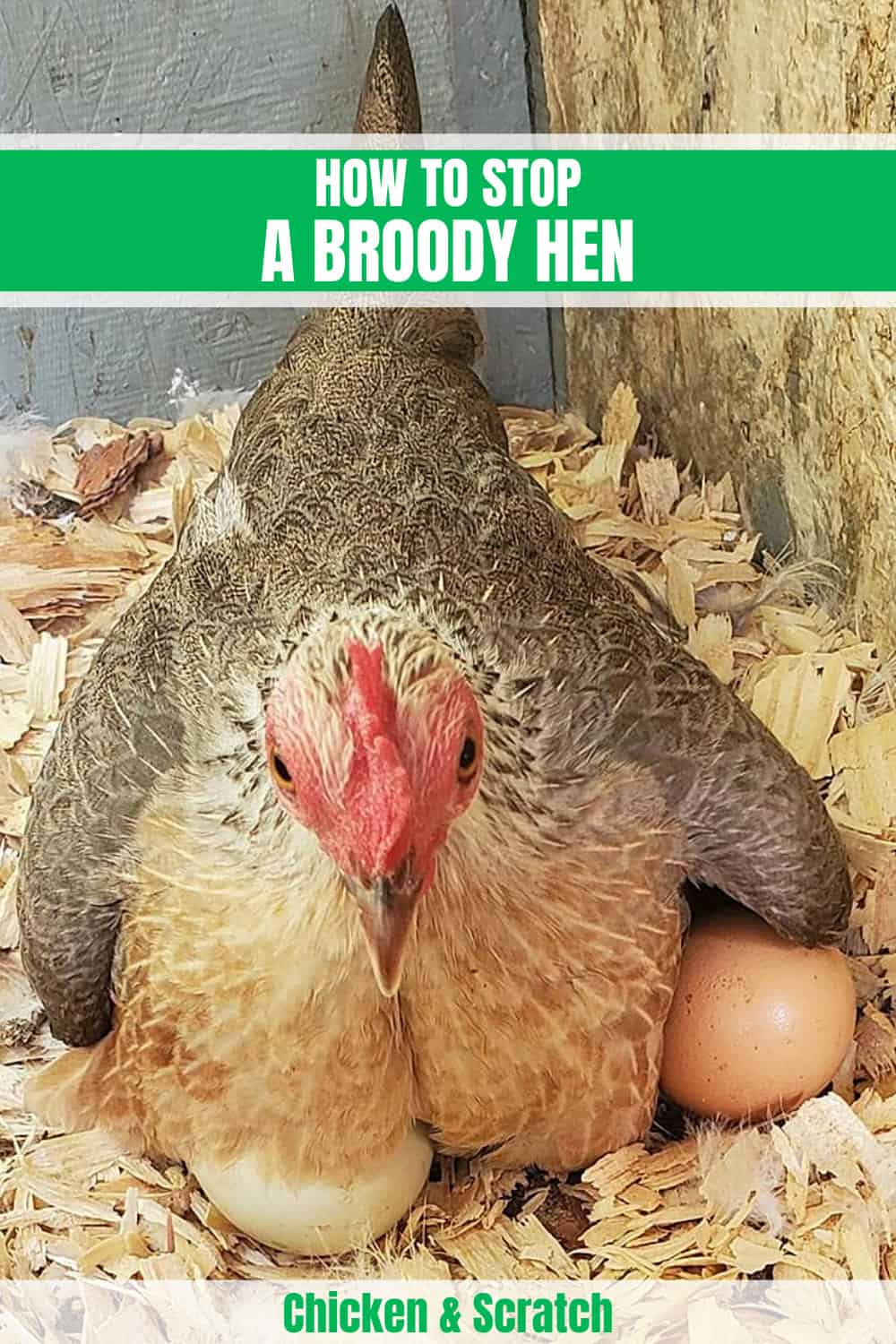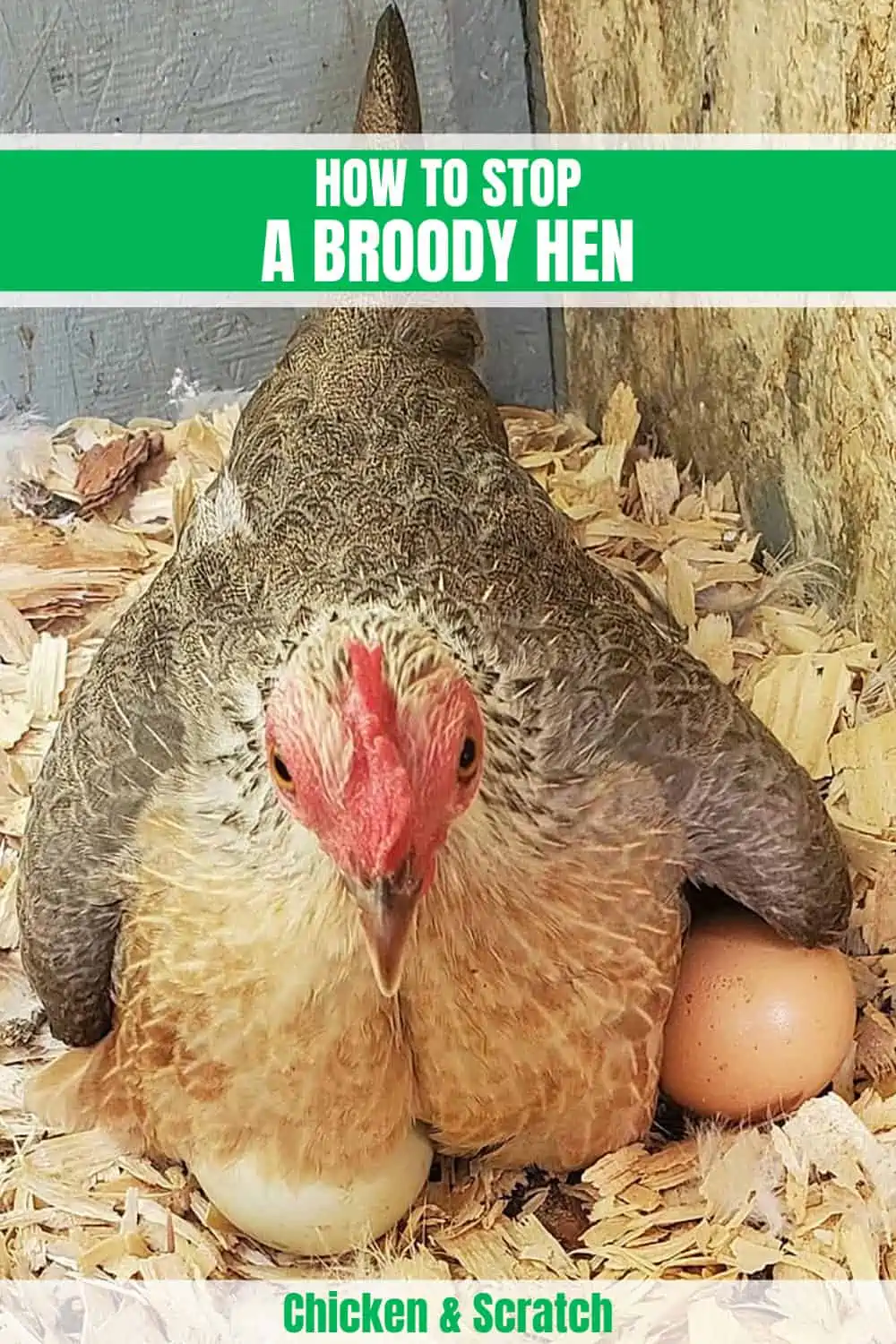Do you have a few hens in a backyard coop or a fully-fledged operation with thousands of layers? Have you had hens since you were young? Or have you recently started it as a new hobby or business? If you have chickens, chances are you have had a broody hen!
What is a Broody Hen?
A broody hen is a hen that decides it is time to start a family! Instead of laying her daily egg and leaving the nest, she stays to keep it warm. Not only that, but she will also linger to keep the other hens’ eggs warm too!
A broody hen will sometimes even move or hide eggs to make a pile for herself to sit on. Once a hen has become ‘broody,’ it has committed itself to sit on the stash of eggs for the 21 days, or so it will take them to hatch.
Other chickens may come and go and lay even more eggs on her mountain of future chicks. If you have a rooster mixed in with your population of hens, then the odds are that most, if not all, of your eggs have been fertilized.
Only fertilized eggs can hatch into chicks. Hens do not need to have a rooster around to become broody. It means that a chicken may start incubating a nest of eggs even if all of it did not undergo incubation.
How Do I Know If My Hen Is Broody?
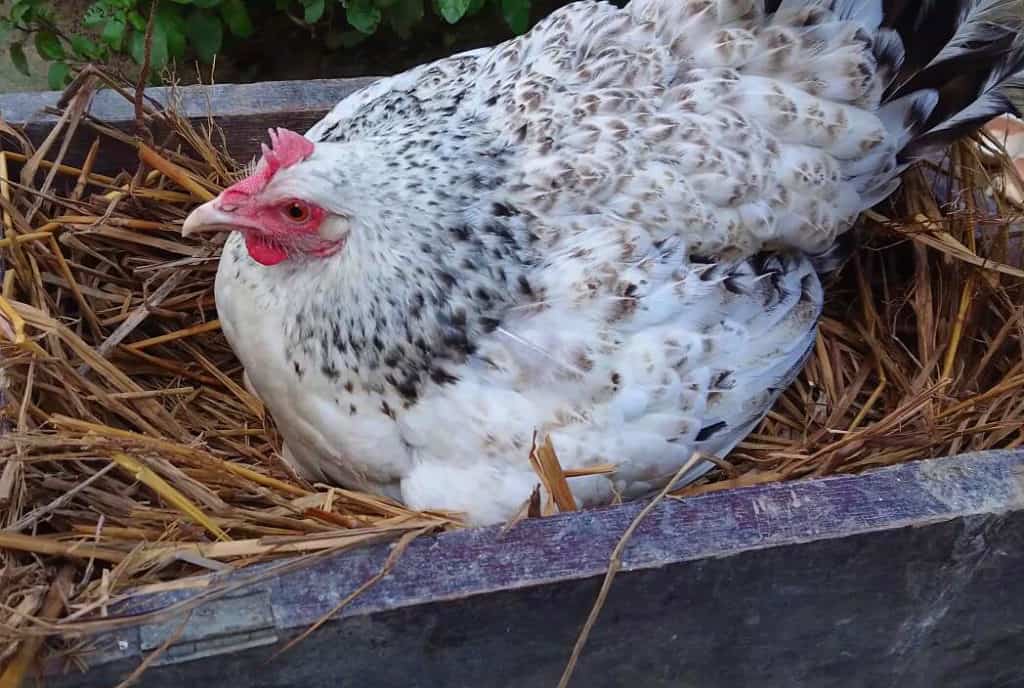
All of this may seem quite adorable to the novice chicken owner. But there are a few problems associated with being broody, including:
- A chicken’s instinct is to incubate its eggs for 21 days until they hatch. During that time, a broody hen may not leave its nest more than once or twice daily. When it does vacate, it will not stay out long to prevent the eggs from getting cold. As a result, it will eat and drink less, get less exercise and stimulation, and not benefit from the sun and fresh air. After three weeks of malnutrition and sedentary living, broody hens may be weaker and more prone to illnessthan their fellow flock members.
- Once broody hens have the number of eggs they plan to incubate, they will stop laying eggs. But you may not appreciate the missed productivity if you have chickens solely for eggs.
- A hen that goes broody often uses her own feathers to line her nest and make it more comfortable. Some chickens will pluck their feathers out to the point where they look very splotchy and unsightly. They often pluck out many or all of their breast feathers for their skin to directly contact their eggs. It leaves the broody hen more vulnerable to extreme temperatures and the possibility of pecking by other hens.
Problems With a Broody Chicken?
Other problems that can be associated with a broody hen include the following:
- If a broody hen is hoarding eggs, freshly laid and older eggs may be in the same pile. You may not be able to seamlessly tell which eggs are on their way to being fully-developed chicks and which are ready to be your breakfast. Although you might be able to use a bright light to see if there is an embryo inside the egg, this is inconvenient to do for each egg. You don’t want to crack an egg with a half-grown chick into your cookie batter or omelet. Trust me.
- A broody hen incubating unfertilized eggs may continue sitting on her nest well past the 21-day mark. She will keep them warm, not realizing they will never hatch since the inside has no developing chicks. The extended period of not eating, drinking, or exercising enough can result in the hen becoming ill or even dying.
- A broody hen is very protective of her nest. She will keep her eggs warm and safe. If you attempt to take her eggs from her, she may peck you repeatedly, flap her wings in your face, or squawk loudly. It is not the most enjoyable way to collect your eggs!
Some chicken owners may allow their broody hens to sit on their nests. Maybe you feel it is time to grow your flock. Or replace older hens and want to have more chicks.
Perhaps you want to give or sell baby chicks to someone else interested in hen-keeping. You might even want to nurture your broody hen’s instinct to tend the eggs, even if you didn’t plan on having chicks this year.
Because laying hens have been bred selectively for generations to avoid an instinct for raising chicks, many hens will not become broody. However, there are certain breeds known for their broodiness. But purchasing fertilized eggs or recently hatched chicks can get expensive for people who like to have a regular way to refresh their flock.
In addition, taking care of incubating and raising baby chicks is messy and time-consuming. It is much easier to leave the hard work to the hens if you have one that has gone broody. On the other hand, if you do not want more chicks, you may want to get your hen to stop being broody.
How Can I Stop A Broody Hen?
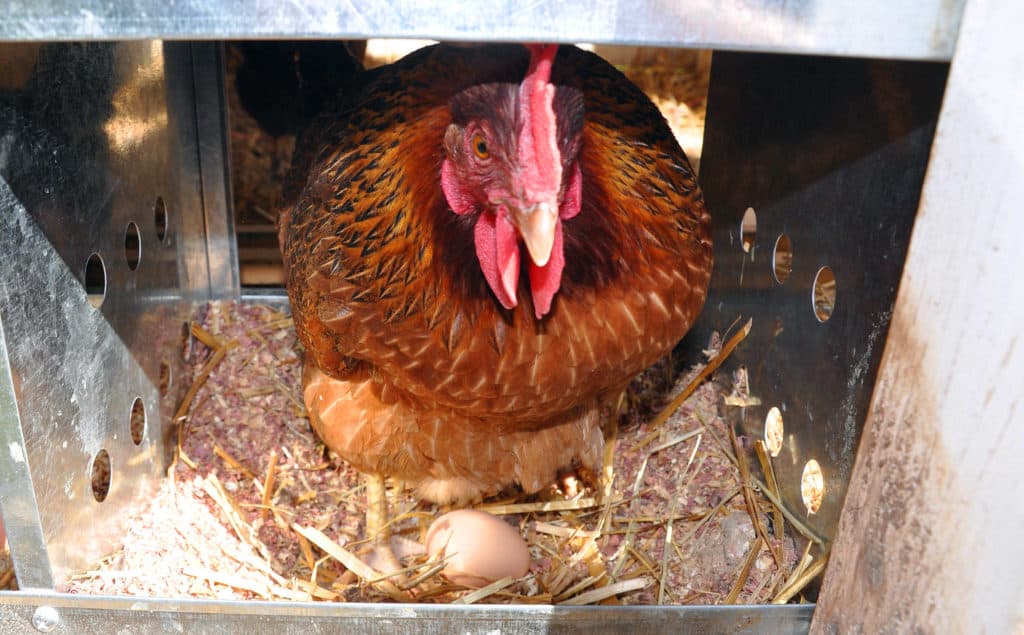
There are several ways you can attempt to do this if you need to. The best way to handle a broody hen is to prevent them from getting broody in the first place. The instinct to care for a nest of eggs gets triggered by the presence of a pile of eggs.
Your hens will be less likely to go broody if you remove your flock’s eggs every day. Also, by ensuring that your hens have multiple places to lay their eggs, they may be scattered instead of piled in your coop.
You can add another egg box if all of your hens’ eggs end up in the same place! However, if your hen is already broody, you either do not have fertilized eggs or do not wish for more chicks. You can let the hen run its course and see if it gives up. Or, you can be more proactive and convince your hen to stop being broody.
Here are four tips on how to handle your broody hen if you want it to stop being broody soon:
1. Removing Hens From the Nest Area
Your hen’s instinct is to stay in her nest as much as possible. If you constantly remove her from the nest area throughout the day, her eggs will get colder. Not only will this make any eggs non-viable, but the hen is also likely to give up and stop trying to sit on her nest.
2. Close the Nest Area
If you keep removing the eggs, and your hen still sits in the exact location, you may need to close the nest down. Block the hen selected box off with cardboard or any object so it cannot use that area. Although the hen may choose a different place to nest, it will likely decide it’s not a good time to hatch some eggs.
3. Destroy the Nesting Box
Many enthusiastic chicken farmers take pride in the comfort of their nesting boxes. They line them with straw, peat moss, and other materials to make them cozy and inviting.
If you are struggling with a broody hen, however, you may want to make the nests less hospitable. Remove extra bedding—the broody hen might decide it’s not conducive enough to sit in long-term.
4. Bring out the Broody Hens
Hens that are persistently broody, for whom the above techniques do not work, may need to be sent to Chicken Jail. Although this may seem harsh, such measures are taken to ensure that the long-term health of the hen doesn’t suffer from weeks of feather-plucking and near-starvation.
By removing the chicken from her coop and isolating her from her flock, her comfort level – and instinct to brood – will be reduced.
Isolate your broody hen in an unused coop or crate, or section them off in a section of her run. Ensure she has plentiful access to food, water, and shade. And that she is protected from the elements and predators. Put her back in her coop on a daily basis. If she immediately returns to a nesting box, put her back in ‘jail.’
Frequently Asked Questions
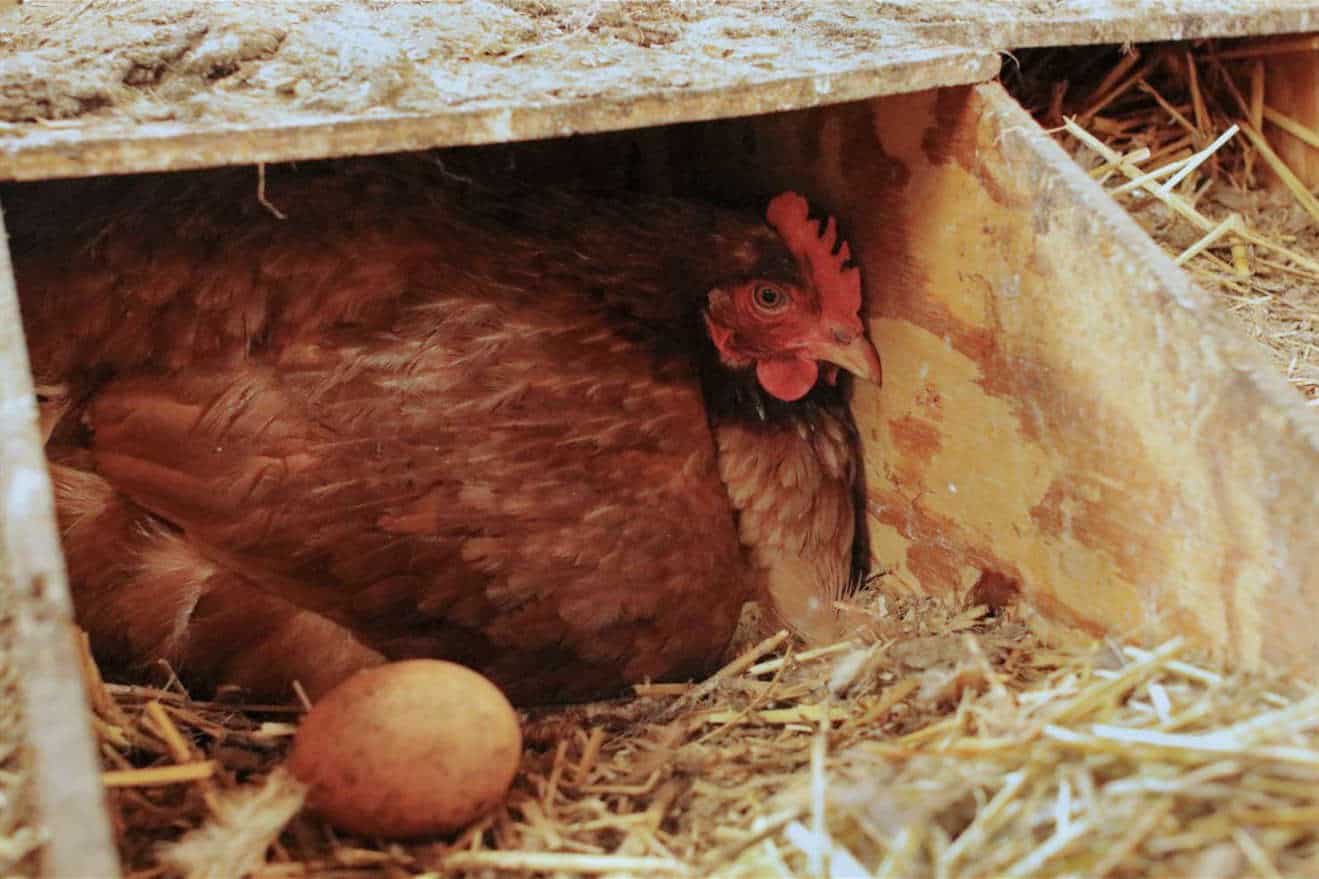
1. Will a broody hen lay eggs again?
Yes, they will! But it will take longer the more time she spends being broody. Usually, it may take 1 to 2 weeks after it breaks up from the first sign of brooding. In severe cases, it can reach up to a month before it returns to its regular laying cycle.
Also, don’t forget to check the condition of your hen. Some may lose weight or have mites after brooding. That way, it is in good condition when it lays another egg.
2. Do broody hens get sad when you harvest their eggs?
Whether it is a regular egg-laying hen or a broody one, they don’t feel saddened. So don’t worry about hurting their feelings!
You can harvest it once they leave their eggs. And yes, some may pick a fight if you attempt to touch their babies. But it’s instinctive for any parent; that’s why it’s best to collect when they are not around.
3. Why do broody hens scream?
Like a dog with a pup, it’s their way of saying to leave the eggs alone. Broody hens tend to growl, hiss, or cackle if someone or something moves past them. They feel grumpy, and the hormonal imbalances take over. Most of these characteristics may last until the chicks start to hatch. When they do this to you, best not to mess with them and give them their space.
4. Do broody hens get picked on?
It’s not impossible for the coopmates to pick on broody hens. That is most especially if it was once bullied earlier, before acting out. Some may pick on it, and others may prevent it from getting food and water. Others may also take advantage of its weakened state because of isolation and inactivity.
You can separate it from the flock until it stops being broody to prevent this.
Summary
Most chicken owners will encounter a broody hen at some point in time. If you do not want baby chicks or do not have fertilized eggs, you need to take measures to prevent your hens from going broody. If your hen goes broody, you may want to act quickly so her egg production—and health—do not suffer.

Joseph Hudson has been raising chickens for over 15 years. In 2018, he completed the Agriculture & Natural Resources program at Mt. San Antonio College. He currently raises over 1400 chickens on his 7.5-hectare farm. He keeps sharing his experience on raising healthy and happy chickens on Chicken Scratch The Foundry.
